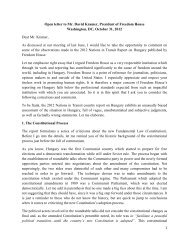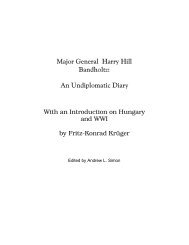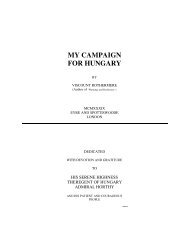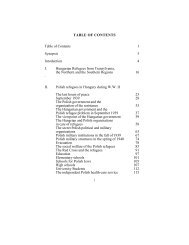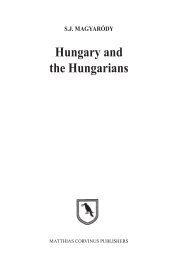The Fate of Western Hungary 1918-1921 - Corvinus Library ...
The Fate of Western Hungary 1918-1921 - Corvinus Library ...
The Fate of Western Hungary 1918-1921 - Corvinus Library ...
You also want an ePaper? Increase the reach of your titles
YUMPU automatically turns print PDFs into web optimized ePapers that Google loves.
addressed a memorandum 63 to Prime Minister Dénes Berinkey (1871-1944)<br />
regarding the “the fate <strong>of</strong> the Magyars and Germans” <strong>of</strong> the city. <strong>The</strong> head <strong>of</strong><br />
Sopron’s council first <strong>of</strong> all stated that “the German and Magyar portions <strong>of</strong> the<br />
city were equally happy” with the statute. “there has never been an ethnic<br />
question in our city. (…) Loud voices have only recently been heard, as a result<br />
<strong>of</strong> Austrian agitation. (…) <strong>The</strong> city’s Hungarian National Council has always<br />
kept affairs <strong>of</strong> the county’s Germans on the agenda; urged the settling <strong>of</strong> the<br />
issue, so that the movement would not deteriorate to the point which, after<br />
separation from <strong>Hungary</strong>, would lead to union with Austria.” Thurner then<br />
drew attention to: “the independence <strong>of</strong> Sopron must be maintained, even<br />
further developed. This is what the city’s economic interest requires, but the<br />
country’s interests demand it, too, regardless whether we view it from the<br />
Hungarian or German point-<strong>of</strong>-view. (…) This fine goal can only be reached if<br />
the city <strong>of</strong> Sopron can remain in its present form, as chartered in 1277 64 and<br />
will not be forced to give up its rights and privileges acquired during the<br />
centuries by being forced by statute 1919:VI, § 2, to become part <strong>of</strong> the German<br />
administrative unit, or the Hungarian area governed by self-government<br />
laws.” 65<br />
During this time, Sopron was mainly a center <strong>of</strong> trade and not industry,<br />
owing to a shortage <strong>of</strong> water, as well as an old center <strong>of</strong> learning, all <strong>of</strong> which<br />
would be lost if it melded into the German-administered portion. <strong>The</strong> mayor<br />
then went on to list the schools, some <strong>of</strong> which were founded several centuries<br />
earlier, and the number <strong>of</strong> their students. 66 At the same time, stressed Thurner,<br />
“Sopron has a need for the locating here <strong>of</strong> the German seat <strong>of</strong> administration<br />
because without it, the city would stop to grow, but it cannot give up its<br />
Hungarian institutions, either. Sopron straddles the boundary between the<br />
German and Hungarian populated areas. (…) Sopron cannot give up either the<br />
Hungarian or German areas. <strong>The</strong> loss <strong>of</strong> either will cut <strong>of</strong>f the circulation <strong>of</strong> a<br />
side <strong>of</strong> our city, leading to the atrophy <strong>of</strong> our economic existence. (…)<br />
Sopron’s success can only be possible if both the Hungarians and Germans<br />
succeed, as a free, independent city, only subordinated to the national<br />
life <strong>of</strong> Sopron between the two wars] In: Magyarok maradtunk, <strong>1921</strong>–1996.<br />
Konferencia a soproni népszavazásról. Sopron, 1996, December 12. [We remained<br />
Hungarians, <strong>1921</strong>-1996. Conference <strong>of</strong> the Sopron plebiscite. Sopron, Dec. 12, 1996].<br />
Szerk/ed.: Turbuly, Éva. Sopron, 1997, pp. 99–105; „Tisztemben csak a város érdeke és<br />
az igazság fog vezetni” [Only the city’s interest and the truth will govern me in my<br />
post]. Szerk./ed.: Turbuly, Éva. Sopron, 1998.<br />
63<br />
Thurner, Mihály: Emlékirat Sopron magyarságának és németségének sorsáról<br />
[Memorandum on the fate <strong>of</strong> the Hungarians and Germans <strong>of</strong> Sopron]. Sopron, 1919,<br />
Rábaközi Nyomda, pp. 1–11. (Sopron Archives, T 8 / 2287.)<br />
64<br />
Ibid, p. 4. Sopron was made a free, royal city by King László IV (1272-1290) <strong>of</strong> the<br />
House <strong>of</strong> Árpád.<br />
65<br />
MOL. K 26. 1240. csomó. 1920–XLII–2035. szám, 9. old.<br />
66 Ibid, pp. 10-11.<br />
31




